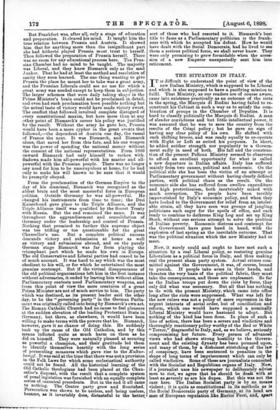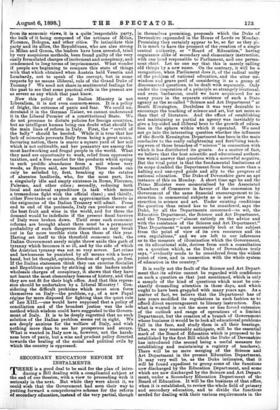THE SITUATION IN ITALY.
IT is difficult to understand the point of view of the new Italian Ministry, which is supposed to be Liberal and which is also supposed to have a pacifying mission to fulfil. That Ministry, as our readers are of course aware, came into existence practically as an outcome of the riots in the spring, the Marquis di Rudini having failed to re- construct his Cabinet in such a way as to satisfy the com- bination of groups in the Chamber of Deputies. It is hard to classify politically the Marquis di Rudini. A man of slender convictions and but little intellectual power, it was assumed that he was to save the country from the results of the Crispi policy ; but he gave no sign of having any clear policy of his own. He shifted with each shifting breeze, and was ready equally to co-operate with Right or Left as suited his purposes. In short, he added neither strength nor popularity to a Govern- ment sadly in need of both. His fall and the construc- tion of the present Pelloux Ministry seemed to observers to afford an excellent opportunity for what is called a new departure in Italian affairs. Italy has suffered mainly from two causes, political and economic. On the political side she has been the victim of an attempt at Parliamentary government without having clearly defined parties, with political chaos as the result. On the economic side she has suffered from swollen expenditure and high protectionism, both inextricably mixed with much corruption. The people have been terribly impoverished by Italy's economic policy, and when they have looked to the Government for relief from an intoler- able strain, all they have seen was groups of jangling politicians each eager for the spoils of office, and each ready to combine to dethrone King Log and set up King Stork, without one serious attempt to solve the problem of Italian poverty. Economic distress and contempt for the Government have gone hand in hand, with the explosion of last spring as the inevitable outcome. That was the political situation which the new Ministry had to meet.
Now, it surely could and ought to have met such a situation by a real Liberal policy, so restoring genuine Liberalism as a political force in Italy, and thus making real the present sham party system. Actual crimes com- mitted against the Government, it was, of course, bound to punish. If people take arms in their hands, and threaten the very basis of the political fabric, they must take the consequences, and those are unpleasant. So far as the Italian troops put down the riots by force, they only did what was necessary. But all that has nothing to do with the present Ministry, which came into office long after the riots were suppressed. What was left for the new rulers was not a policy of mere repression in the urgent interests of social order, but of conciliation and reform, which one would have supposed a nominally Liberal Ministry would have hastened to adopt. But nothing of the kind has been done. In place of such a line of action, there has been a severe and vindictive and thoroughly reactionary policy worthy of the Red or White " Terror," disgraceful to Italy, and, as we believe, seriously compromising her future. Every person of advanced views who had shown strong hostility to the Govern- ment and. the existing dynasty has been pounced upon, and many of them, by a dishonest stretching of the law of conspiracy, have been sentenced to penalties in the shape of long terms of imprisonment which can only be called vindictive. Some of these are journalists connected with the Socialist and Republican organs of Italy. Now, if a journalist uses his newspaper to deliberately advise men to riot, we agree that he should be dealt with at least as severely as are his dupes. But this was not the case here. The Italian Socialist party is by no means violent ; it is quite as constitutional in its methods as is the Social Democratic party of Germany, at its head are men of European reputation like Enrico Ferri, and, apart from its economic views, it is a quite :respectable party, the bulk of it being composed of the artisans of Milan, Florence, Bologna, and other cities. To intimidate this party and its allies, the Republicans, who are also strong in Milan and Genoa, the leaders have been arrested, tried by very suspicious methods, been found guilty of the very easily formulated charges of incitement and conspiracy, and condemned to long terms of imprisonment. What wonder if people are beginning to compare this state of things with that which obtained when Austria held Venetia and Lombardy, not to speak of the corrupt, but in some respects by no means illiberal, rule of the Grand Duke of Tuscany ? We need. not share in sentimental feelings for the past to see that some practical evils in the present are as severe as any which that past knew.
Now this policy of the Italian Ministry is not Liberalism, it is not even common-sense. It is a policy of fright, the outcome of panic and fear. We could un- derstand it in the German Kaiser, we cannot understand it in the Liberal Premier of a constitutional State. We do not presume to dictate policies for foreign countries, but no intelligent human being can doubt what should be the main lines of reform in Italy. First, the " revolt of the belly" should be heeded. While it is true that her lack of minerals prevents Italy from being a great manu- facturing nation, there is scarce a square yard of her soil which is not cultivable, and her peasantry are among the most hardworking and frugal people in the world. What they need are opportunity to work, relief from oppressive taxation, and a free market for the products which spring in such prolific abundance from a soil whose very weeds, as Byron said, are beautiful. These needs can only be satisfied by, first, breaking up the estates of absentee landlords, who, for the most part, live a singularly idle and empty existence in Rome, Florence, Palermo, and other cities ; secondly, reducing both local and national expenditure (a task which means a tremendous fight with the official class) ; and thirdly, either Free-trade or as close an approximation thereto as the exigencies of the Italian Treasury will admit. From end to end of the peninsula, Italy can produce some of the best fruit and wine in the world, and for those the demand would be indefinite if the present fiscal barriers of Italy were broken down. Until some such economic reforms are brought about there must be a permanent probability of such dangerous discontent as may break out in far more terrible riots than those of this year. Having set itself to this threefold economic task, the Italian Government surely might throw aside this garb of tyranny which becomes it so ill, and by the side of which the Austrian tyranny was not so very severe. Let crime and lawlessness be punished by all means with a heavy hand, but let thought, opinion, freedom of speech, go free. If the Italian statesmen think they can exorcise Socialist and Republican opinion by striking at the leaders under wholesale charges of conspiracy, it shows that they have not learnt the most elementary lessons of history, and that they are not fit for their high office. And that this repres- sion should be undertaken by a Liberal Ministry ! Con- sidering the difficult problems which must soon force themselves on Italy—the problem, e.g., of a new Papal regime far more disposed for fighting than the quiet rule of Leo XIII.—one would have supposed that a policy of conciliation and of the broadest justice was the sole method which wisdom could have suggested to the Govern- ment of Italy. It is to be deeply regretted that no such solution of the Italian problem seems yet in sight. We are deeply anxious for the welfare of Italy, and wish nothing more than to see her prosperous and secure. What is wanted in Italy now is, however, not the harsh- ness born of panic, but a wise and prudent policy directed towards the healing of the social and political evils by which the country is oppressed.



































 Previous page
Previous page